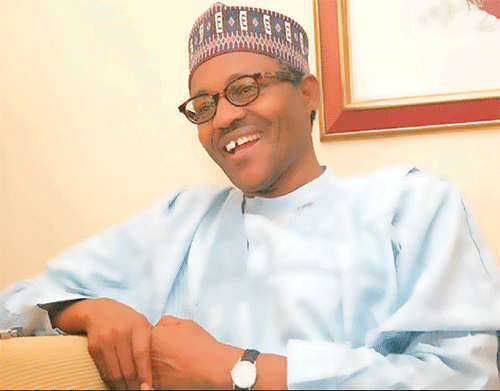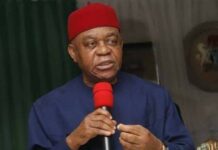Apparently to help Nigeria consolidate on the recent peaceful transition to a new democratic dispensation, the main drivers of global economy, the group of seven (G7) industrialised nations, asks Nigeria’s new president to come along with a wish list, reports Correspondent, SAM NWOKORO.

There is no doubt any longer that the world is very much interested in Nigeria, especially her economy and polity. This accounted for why virtually all the nations that matter in the world showed interest in its last presidential election. The all have stakes. In the last one decade, Nigeria has liberalised her economy and opened it to the outside world, and implicitly to the dynamics of international politics and economics, with the attendant interests that go with it.
Nigeria’s commitments in bilateral and multilateral engagements, treaties and conventions and in the activities of international organisations impel it to increase the tempo of its diplomatic activities. In the last couple of years also, the country has garnered many foreign direct investments from countries around the world. These countries now have stakes in Nigerian economy more than ever before. Virtually all the G7 countries – United states, Britain, Canada, Germany, Japan, France, and Italy – and including lately Russia (as G7 observer member) have investments from oil and gas to machinery, automobile, power, agriculture and even security as it pertains to Nigeria.
Besides, the war on sectarian terrorism, which Nigeria is executing in the North East part of the country, has become such that global concern has been hyped more than was the case before 2010. The Boko Haram insurgents that pushed for separate Islamic republic launched Nigeria into the unenviable league of ‘marked’ nations. It took concerted regional and global consensus building and collaboration for the terror to be contained for the election that produced President Muhammadu Buhari to take place. Virtually all the G7 countries, especially Washington and Britain, played vital roles to enable the election take place and produce a result which, for the first time in Nigerian history, a defeated incumbent did not contest against, but conceded defeat.
Background to invitation
Before the invitation to the newly-elected president to attend the forthcoming G7 Summit in Schloss, Germany, was extended to him, the president had met with British Prime Minister, David Cameron, and U.S. Secretary of State, John Kerry, Nigeria’s most strategic relations in the West. It was reportedly Cameron that personally informed the new president that the G7 member countries had asked him to attend the Spring Summit holding from June 7 to 8, 2015 with a wish list.
Delivering a message to President Buhari penultimate Friday, shortly after the inauguration, British Secretary for Foreign and Commonwealth Affairs, Philip Hammond, said the PM had requested a list of what Nigeria wanted to help her succeed against the current challenges facing the country.
He had said on behalf of Cameron: “We are waiting for your own list.”
The meeting was sequel to the one between Buhari and Cameron at which commitments were given to Nigeria in several areas including the fight against terrorism,, power and energy and such matters of common concern as immigration challenges facing the African continent in which Nigeria is being perceived by the big powers as a leader, as well as what Hammond described as “intelligence fusion” to secure Africa from global terror. Hammond also raised the issue of free trade between the European Union (EU) and Africa, a proposal he said enjoyed the support of several countries on the continent and of which he sought to enlist the backing of the new Nigerian president.
In similar gesture, Asia’s economic regional power represented by Han Changfu, the leader of the China delegation at the swearing-in and who is also China’s Agriculture Minister, asked Buhari to “open avenues for Chinese investment in Nigeria”. China, he said, promises to help Nigeria out in several areas including agriculture, power, railway and infrastructure.
The G7 Summit 2015 holds between June 7 and 8 in Scloss Elmau in the Upper Bavarian region of Germany where issues regarding foreign security, policy issues, energy security, climate and other United Nations conferences scheduled for the rest of the year will be previewed. The G7, which drive global economy and security, is seen by the rest of the developing and under-developed nations of the world as the ones to lead other nations in implementing UN resolutions, protocols and programmes for the wellbeing of the earth’s over seven billion people.
Other issues which the G7 summit will discuss at the summit include marine protection and resource efficiency. On the health sector, it will deliberate on mankind’s health status regarding anti-biotic resistance, neglected and poverty-related diseases, and the Ebola scourge. The rest include retail and supply standards, and empowering self-employed women and those in vocational training as an urgent step in achieving one of the important UN mandates – the Millennium Development Goals (MDGs).
In 2014, the G7 resolved to pursue a community of shared values in which the members pledged to have a special responsibility when it comes to shaping our planet.
“As a community of shared values, the G7 would continue to work towards the establishment of peace and security and ensuring people can live a self-determined life. Freedom and human rights, democracy and the rule of law, peace and security, prosperity and sustainable development are core principles agreed by G7,” the industrial powers resolved at its last summit which was overshadowed by the group’s indignation against Russia’s ‘illegal’ annexation of Crimea last year.
That singular Kremlin audacity, obviously a practical reaction against G7’s refusal to formally admit her into the club, unsettled not a few domestic issues in the individual G7 countries, and even in the larger EU. For one, the issue of energy sustainability in some of the G7 member states in Europe dominated last year’s summit and the group crafted agenda to follow up with some resolution adopted to contain the looming threat of managing domestic energy policies in the likelihood of total boycott of Russian oil, if it becomes inevitable to tame Kremlin’s braggadocio over Crimea, something that indented sour points in trans-Atlantic relation between the West represented by Washington and her European allies (chiefly fellow G7 members) and Russia. G7 had unequivocally distanced itself from Russia unless she lets Crimea off.
Last year’s resolutions
Part of the major resolutions of the group during last year’s summit, which will be followed up this year, read: “The heads of state and government of G7 countries met in Brussels from June 4 to 5, 2014, after deciding on March 24, 2014 to suspend their co-operation with Russia because of its annexation of Crimea in violation of international law. The development in Ukraine and relations with Russia played a central role at the summit, but the G7 leaders directed their efforts towards communicating clear messages on foreign policy, the world economy, energy and climate and development policy and Africa.”
The G7 also launched an initiative on improving energy supply security. It said: “In addition to chart short-term measures such as threat assessment and emergency plan for the coming winter, an action plan to increase gas supply security is to be developed by the international energy agency (IEA) working with the European Union (EU) by the end of 2014. The G7 energy ministers will meet again under the German Presidency (Angela Merkel) in 2015 to move this initiative forward.”
Also reiterated its commitment to the goal of limiting the rise in global average temperature to below two degrees Celsius, it added: “Within the United Nations Framework Convention On Climate Change (UNFCCC), the G7 remains committed to seeing that a global agreement, a new protocol, another legal instrument or an agreed outcome with legal force under the convention applicable to all parties is adopted in 2015 for the period after 2020.” The members also welcomed the climate change summit of the United Nations Secretary-General in September 2014, and also affirmed their support for the commitment of developed countries to mobilise $100 billion per year by 2020 and welcomed the Green Climate Funds operating rules as well as the decision to begin the initial resource mobilisation in coming months.
“Under the Montreal Protocol, the G7 will work to wind down the production of hydrochlorocarbons (HFC),” it said, adding that “the group underlined its special responsibility for developing the post-2015 agenda for sustainable development, aiming for an ambitious and universal agenda based on a single set of clear and measurable goals”.
Buhari’s Nigeria ‘shop list’
The newly-inaugurated Nigerian president will be having his first international outing at this year’s G7 Summit which Nigeria has the privilege of attending since 2010 as observer or special guest among the group of emerging economies of the southern hemisphere that included South Africa, Malaysia, India and Thailand.
It is interpreted in international circles that the G7 would be disposed towards opening more market access to a country like Nigeria, especially in the area of gas supply, given the uncertainty of Kremlin in pushing back from Crimea, and would not mind cutting petroleum and gas supplies to Europe, and even threatening America’s multi-billion dollar investments in Russia’s oil and gas sector, if the western pressure on her to let go of Crimea gets tougher.
Other issues in the G7 agenda that could be more beneficial to Nigeria include:
Terrorism: Nigeria is contending with insurgency problems, in short terrorism, in most parts of the North. Here, according to experts, is where the Nigerian president should seek more support from G7 countries. Its fight against terror has been made difficult by lack of modern intelligence gathering resources. Related to this is intelligence sharing.
Loot recovery: Recently, Nigeria’s former Minister of Finance, Ngozi Okonjo-Iweala, told the public that the federal government under former President Goodluck Jonathan filed various applications from America to Europe requesting the repatriation of various amounts stolen and stashed abroad by former Nigerian military ruler, Sani Abacha. It is the expectation of Nigerians that Buhari would follow up from where his predecessor left in seeking the assistance and support of the G7 members in retrieving much of Nigeria’s stolen money. The G7 invitation extended to him to come with a wish list is interpreted as open assurance that he would get the needed assistance in this direction if he makes the move.
Power: Nigeria’s power sector reform is facing hiccups, mainly shortage of gas to power plants. Vandalism is reported to be the major cause of gas shortage. But the issue of adequate gas supply goes beyond fixing pipelines and securing them; there is the political aspect of it. Foreign investments of various descriptions have gone into the power sector since 2003. Thus the privatisation of the sector, if irreversible, needs both local and international collaboration to work.
Africa’s presence in UNSC: Nigeria is being tipped as potential permanent member of the African continent at the UN Security Council. The meeting with the G7 provides Nigeria one more opportunity to prove its capability, moreso having conducted a peaceful poll.
Technology/environmental remediation: At its summit last year, the G7 members said they would be committing $100 billion in the next five years in tackling environmental challenges, especially global warming and ecological remediation. Nigeria is one huge part of the world where the rich nations have little investments in environmental remediation, but have contributed more through their various companies in degrading significant portions of Nigeria’s ecosystem to date. The recent United Nations Environmental Protection (UNEP) court judgment that awarded $1 billion to the people of Ogoni where Nigeria faces one of the grimmest environmental calamity in the near future, if nothing is done urgently in ecosystem reclamation, has not been complied with. The summit provides the president opportunity to canvass for the G7 commitment in environmental remediation projects in Nigeria where their nationals operate.
Technical aid/market access: Nigerian exports still suffer poor patronage in most European markets, despite the talks about EU-African partnership and the New Partnership for African Development (NEPAD). President Buhari should make use of the summit to push for more market access of Nigerian products and also for women and girl-child empowerment in African countries.
















